Canon LC-XWUX5800, LC-XWUX6700, LC-XWUX7500 User Manual
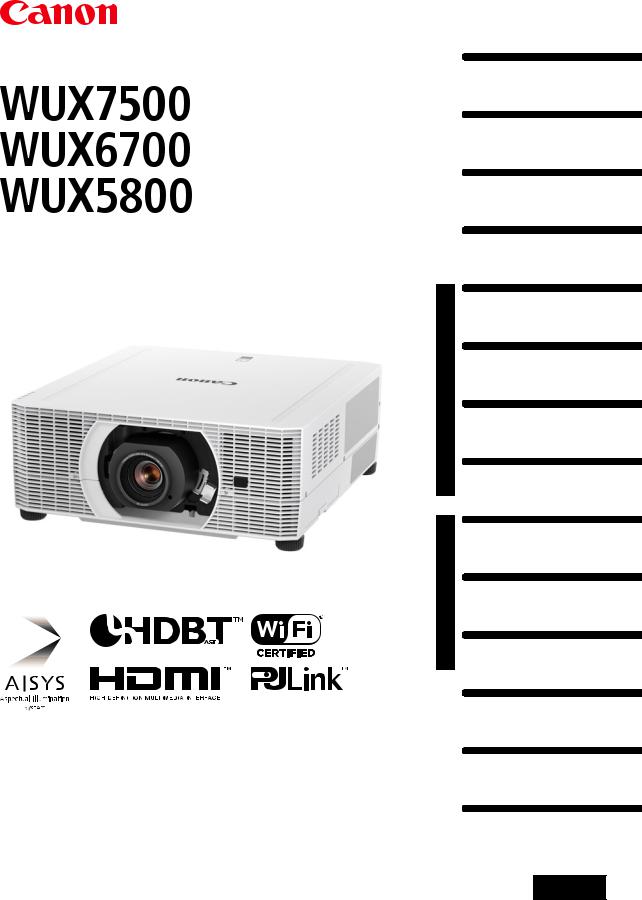
MULTIMEDIA PROJECTOR
User’s Manual
|
|
Safety Instructions |
|
|
|
Before Use |
|
|
|
||
Basic |
|
Projection Procedure |
|
|
|
||
Guide |
|
Convenient Projection |
|
|
|
Features |
|
Installation |
Installation Procedure |
||
Connection Procedure |
|||
|
|
||
Guide |
Adjusting the Image |
||
|
|
||
Special Arrangements
Using Menus
Menu |
Menu Configuration |
|
Guide |
||
|
Menu Description
Maintenance
Product Specifications
Troubleshooting
ENG
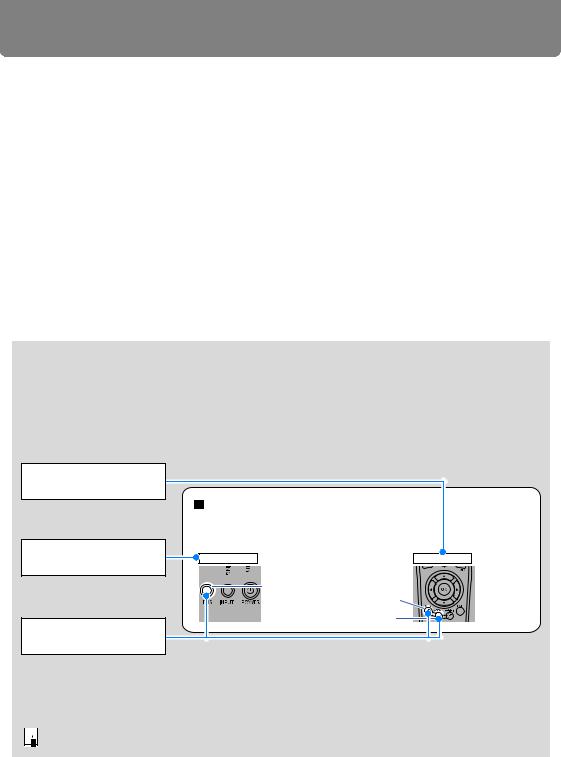
How to Use This Manual
Thank you for purchasing a Canon projector.
The WUX7500/WUX6700/WUX5800 Multimedia Projector is a highperformance projector that is capable of projecting a high-resolution computer screen and high-quality digital image on a large screen.
This Manual
This is the user’s manual for WUX7500/WUX6700/WUX5800 Multimedia Projector (hereafter, “projector”). The “Basic Guide” describes basic steps before projection and introduces features that are convenient in presentations and other situations. The “Installation Guide” covers how to install the projector and join a network, and the “Menu Guide” explains setting menus and how to use them.
Read this manual thoroughly to make the most of your projector. We recommend requesting installation by a qualified technician or the Canon Customer Support Center.
Symbols of Button Operations
The projector can be operated using the buttons on the remote control or on the side of the projector. The remote control allows you to operate all functions of the projector.
In this document, the button’s operations are shown as below.
Remote control button operation
Operation of buttons on side of projector
Focusing / Resizing the Image
Press the ZOOM button on the remote control to adjust the image size, and press the FOCUS button to adjust the focus. You can also press the LENS button on the
projector once to adjust focus and twice to adjust image size.
Projector |
Remote control |
Indicate the buttons to be pressed
LENS button |
FOCUS button |
ZOOM button |
Symbols Used in This Manual
Sections labeled with these symbols give the following kinds of information.  Indicates precautions and information to note when using the projector.
Indicates precautions and information to note when using the projector.
2

Table of Contents |
|
How to Use This Manual............... |
2 |
Projector Highlights...................... |
5 |
Safety Instructions........................ |
7 |
Safety Symbols in this Manual ........... |
13 |
Precautions for Use ............................. |
14 |
Power Supply ....................................... |
14 |
Installation and Use ............................. |
16 |
Lamp ..................................................... |
19 |
Remote Control Batteries.................... |
20 |
Handling................................................ |
20 |
For Safe Use ................................ |
22 |
Carrying and Installation..................... |
22 |
Before Installation....................... |
24 |
Precautions When Carrying / Shipping |
|
the Projector......................................... |
24 |
Precautions for Installation................. |
24 |
Wireless LAN (Wi-Fi)............................ |
29 |
Open Source Software ............... |
30 |
Before Use ................................... |
31 |
Included Accessories .......................... |
31 |
Projector Part Names and |
|
Functions.............................................. |
32 |
Remote Control .................................... |
36 |
Basic Guide ............................ |
41 |
Projection Procedure.................. |
42 |
Step 1 Connect Other Equipment....... |
43 |
Step 2 Turn the Projector On .............. |
44 |
Step 3 Select an Input Signal.............. |
45 |
Step 4 Adjust the Image ...................... |
46 |
Step 5 Select the Image Quality |
|
(Image Mode)........................................ |
47 |
Turn the Projector Off.......................... |
49 |
Convenient Projection |
|
Features ....................................... |
50 |
Convenient Features ........................... |
50 |
Projecting Images on a USB Flash |
|
Drive ...................................................... |
54 |
Projecting Two Images Side by |
|
Side ....................................................... |
58 |
Installation Guide................... |
60 |
Installation Procedure................. |
61 |
Relationship Between Projecting |
|
Distance and Image Size ..................... |
61 |
Installing / Removing the Lens Unit ... 65 |
|
Installation ............................................ |
68 |
Adjusting Peripheral Focus ................ |
72 |
Connection Procedure................ |
76 |
Connecting Other Equipment ............. |
76 |
Connecting to a Network..................... |
81 |
Controlling the Projector from a |
|
Computer .............................................. |
95 |
Adjusting the Image .................... |
97 |
Filling the Screen ................................. |
97 |
Adjusting Keystone Distortion ......... |
101 |
Adjustment Using a Test Pattern ..... |
105 |
Special Arrangements .............. |
106 |
Projecting from Multiple Projectors at |
|
Once (Edge Blending) ....................... |
106 |
Using PC-Free Multi Projection ........ |
112 |
Menu Guide .......................... |
116 |
Using Menus.............................. |
117 |
Menu Configuration .................. |
120 |
Menu Description ...................... |
126 |
Input settings ..................................... |
126 |
Image adjustment .............................. |
134 |
Install settings.................................... |
142 |
System settings ................................. |
153 |
Network settings ................................ |
173 |
Checking Projector Information ....... |
188 |
Projector Web Screen Menu..... |
189 |
Maintenance / |
|
Product Specifications / |
|
Troubleshooting .................. |
206 |
Maintenance............................... |
207 |
Cleaning the Projector....................... |
207 |
Cleaning the Air Filter........................ |
207 |
Replacing the Air Filter...................... |
208 |
Replacing the Lamp........................... |
210 |
Replacement Lamp ............................ |
211 |
Lamp Replacement Procedure ......... |
212 |
3

Table of Contents |
|
Product Specifications ............. |
214 |
Troubleshooting........................ |
224 |
LED Indicator Details......................... |
224 |
Symptoms and Solutions.................. |
225 |
Index........................................... |
232 |
Option ........................................ |
234 |
4

Projector Highlights
High-Resolution LCOS Projection
Projection at 1920x1200 (WUXGA), thanks to high-resolution reflective liquid crystal on silicon (LCOS) panels.
Peripheral Focus Adjustment
Image focus can be adjusted on the edges of the screen, enabling use in dome projection.
HDBaseT Input
The projector supports HDBaseT, a next-generation connectivity standard. HDBaseT offers a convenient connection for carrying high-quality video and audio signals equivalent to HDMI across distances up to 100 m (328.1') over a single LAN cable.
Lens Shift
Lens shift enables motorized image repositioning up, down, left, or right for greater freedom in installation.
Motorized Zoom and Focus Adjustment
Efficient setup using motorized zoom and focus adjustment.
Full Range of Lens Units Available
Choose the optimal lens unit for the projection distance or purpose.
Superior Video Viewing Experience
Refinements in motion blur reduction make video projection more enjoyable to watch.
Scheduling
Automate projector tasks according to your schedules. Turn the projector on or off, switch input signals, and more.
Edge Blending
Blend the overlapping edges of images from multiple projectors to make the overall image more seamless.
Networked Multi-Projection (NMPJ)
Project images from multiple computers via a network connection.
5

Projector Highlights
Wi-Fi Connectivity
In addition to wired LAN connectivity, the projector also supports Wi-Fi.
In Projector Access Point (PJ AP) mode, the projector can be connected to up to five computers without using a wireless access point.
Canon Service Tool for PJ (Canon ST)
An iOS app for easy remote control and status management of projectors over WiFi. Connect to a projector used as an access point (P82), or connect via an existing access point (P82). Note that a password is required when using Canon ST (P189).
6

Safety Instructions
Before installing and operating the projector, read this manual thoroughly. This projector provides many convenient features and functions. Operating the
projector properly enables you to manage those features and maintain it in good condition for many years to come.
Improper operation may result in not only shortening the product life, but also malfunctions, fire hazards, or other accidents.
If your projector does not seem to be operating properly, read this manual again, check operations and cable connections, and try the solutions in the “Troubleshooting” section in the back of this manual. If the problem still persists, contact the Canon Customer Support Center.
CAUTION
RISK OF ELECTRIC SHOCK
DO NOT OPEN
CAUTION: TO REDUCE THE RISK OF ELECTRIC SHOCK, DO NOT REMOVE COVER (OR BACK). NO USER-SERVICEABLE PARTS INSIDE EXCEPT LAMP REPLACEMENT. REFER SERVICING TO QUALIFIED SERVICE PERSONNEL.
THIS SYMBOL INDICATES THAT DANGEROUS VOLTAGE CONSTITUTING A RISK OF ELECTRIC SHOCK IS PRESENT WITHIN THIS UNIT.
THIS SYMBOL INDICATES THAT THERE ARE IMPORTANT OPERATING AND MAINTENANCE INSTRUCTIONS FOR THIS UNIT IN THE OWNER’S MANUAL.
CAUTION
Not for use in a computer room as defined in the Standard for the Protection of Electronic Computer / Data Processing Equipment, ANSI / NFPA 75.
Instructions Safety
7

Safety Instructions
 Safety Precautions
Safety Precautions
WARNING:
•THIS APPARATUS MUST BE GROUNDED.
•TO REDUCE THE RISK OF FIRE OR ELECTRIC SHOCK, DO NOT EXPOSE THIS APPLIANCE TO RAIN OR MOISTURE.
•This projector produces intense light from the projection lens. Do not stare directly into the lens, otherwise eye damage could result. Be especially careful that children do not stare directly into the beam.
•Install the projector in a proper position. Otherwise it may result in a fire hazard.
•Do not cover the ventilation slots on the projector. Heat build-up can reduce the service life of your projector, and can also be dangerous.
•If the projector is unused for an extended time, unplug the projector from the power outlet.
•Do not project the same image for a long time.
An afterimage may remain on the LCD panels due to the characteristics of the panels of the projector.
 CAUTION ON HANGING FROM THE CEILING
CAUTION ON HANGING FROM THE CEILING
When hanging the projector from the ceiling, clean the air intake vents and top of the projector periodically with a vacuum cleaner. If you leave the projector unclean for a long time, the cooling fans can be clogged with dust, and it may cause a breakdown or a disaster.
DO NOT SET THE PROJECTOR IN GREASY, WET, OR SMOKY CONDITIONS SUCH AS IN A KITCHEN TO PREVENT A BREAKDOWN OR A DISASTER. IF THE PROJECTOR COMES IN CONTACT WITH OIL OR CHEMICALS, IT MAY BECOME DETERIORATED.
8

Safety Instructions
■ READ AND KEEP THIS OWNER’S MANUAL FOR LATER
USE.
All the safety and operating instructions should be read before beginning to operate the product.
Read all of the instructions given here and retain them for later use. Unplug this projector from the AC power supply before cleaning. Do not use liquid or aerosol cleaners on the projector. Use a damp cloth for cleaning.
Follow all warnings and instructions marked on the projector.
For added protection of the projector during a lightning storm, or when it is left unattended or unused for long periods of time, unplug it from the wall outlet. This will prevent damage due to lightning and power surges.
Do not expose this unit to rain or use near water... for example, in a wet basement,
near a swimming pool, etc...
Do not use attachments not recommended by the manufacturer as they may result in hazards.
Do not place this projector on an unstable cart, stand, or table. The projector may fall, causing serious injury to a child or adult, and serious damage to the projector. Use only with a cart or stand recommended by the manufacturer, or sold with the projector. Wall or shelf mounting should be carried out in accordance with the manufacturer’s directions, and should use a mounting kit approved by the manufacturers.
An appliance and cart combination should be moved with care.
Sudden stops, excessive force, and uneven surfaces may cause the appliance and cart combination to overturn.
Slots and openings in the rear and front of the cabinet are provided
for ventilation, to insure reliable operation of the equipment and to protect it from overheating.
The openings should never be covered with cloth or other materials, and the bottom opening should not be blocked by placing the projector on a bed, sofa, rug, or other similar surface. This projector should never be placed near or over a radiator or heat register.
This projector should not be placed in a built-in installation such as a book case unless proper ventilation is provided.
Instructions Safety
9

Safety Instructions
Never push objects of any kind into this projector through cabinet slots as they may touch dangerous voltage points or short out parts that could result in a fire or electric shock. Never spill liquid of any kind onto the projector.
Do not install the projector near the ventilation duct of air-conditioning equipment.
This projector should be operated using only the type of power source indicated on the marking label. If you are not sure of the type of power supplied, contact the Canon Customer Support Center or local power company.
Do not overload wall outlets and extension cords as this can result in fire or electric shock. Do not allow anything to rest on the power cord. Do not locate this projector where the cord may be damaged by people walking on it.
Do not attempt to service this projector yourself as opening or removing covers may expose you to dangerous voltages or other hazards. Refer all servicing to qualified service personnel.
Unplug this projector from the wall outlet and refer servicing to qualified service personnel under the following conditions:
a.When the power cord or plug is damaged or frayed.
b.If liquid has been spilled into the projector.
c.If the projector has been exposed to rain or water.
d.If the projector does not operate normally after following the operating instructions. Adjust only those controls that are covered in the operating instructions as improper adjustment of other controls may result in damage and will often require extensive work by a qualified technician to restore the projector to normal operating condition.
e.If the projector has been dropped or the cabinet has been damaged.
f.When the projector exhibits a distinct change in performance-this indicates a need for servicing.
When replacement parts are required, be sure the service technician uses replacement parts specified by the manufacturer that have the same characteristics as the original parts. Unauthorized substitutions may result in fire, electric shock, or injury.
Upon completion of any service or repairs to this projector, ask the service technician to perform routine safety checks to determine that the projector is in safe operating condition.
10
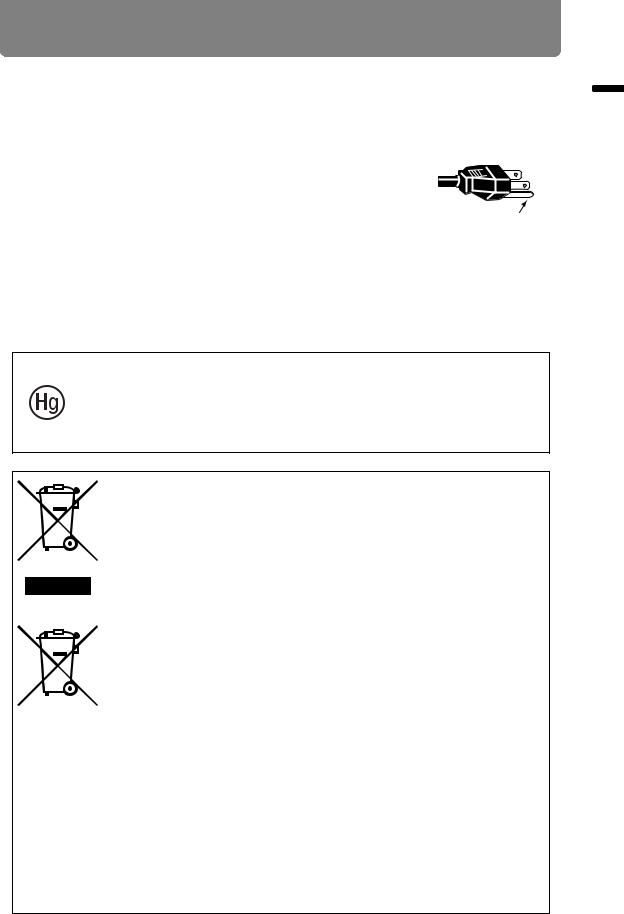
Safety Instructions
AC Power Cord Requirement
The AC Power Cord supplied with this projector meets the requirements for use in the country you purchased it.
AC Power Cord for the United States and Canada: |
|
|
|
|
|
The AC Power Cord used in the United States and Canada is |
|
|
listed by the Underwriters Laboratories (UL) and certified by |
|
|
the Canadian Standard Association (CSA). |
Ground |
|
The AC Power Cord has a grounding-type AC line plug. This is |
|
|
|
|
|
a safety feature to ensure the plug fits into the power outlet. Do |
|
|
not try to tamper with this safety feature. Should you be unable |
|
|
to insert the plug into the outlet, contact your electrician. |
|
|
|
|
|
THE SOCKET-OUTLET SHOULD BE INSTALLED NEAR THE EQUIPMENT AND EASILY ACCESSIBLE.
For the U.S. and Canada, LAMP (S) INSIDE THIS PRODUCT CONTAIN MERCURY AND MUST BE RECYCLED OR DISPOSED OF ACCORDING TO LOCAL, MUNICIPAL, STATE, PROVINCIAL, OR FEDERAL LAWS. For lamp recycling and disposal information please call 1-800-OK-CANON for the U.S. and Canada.
Only for European Union and EEA (Norway, Iceland and
Liechtenstein)
These symbols indicate that this product is not to be disposed of with your household waste, according to the WEEE Directive (2012/ 19/EU), the Battery Directive (2006/66/EC) and/or national legislation implementing those Directives.
If a chemical symbol is printed beneath the symbol shown above, in accordance with the Battery Directive, this indicates that a heavy metal (Hg = Mercury, Cd = Cadmium, Pb = Lead) is present in this battery or accumulator at a concentration above an applicable threshold specified in the Battery Directive.
This product should be handed over to a designated collection point, e.g., on an authorized one-for-one basis when you buy a new similar product or to an authorized collection site for recycling waste electrical and electronic equipment (EEE) and batteries and accumulators. Improper handling of this type of waste could have a possible impact on the environment and human health due to potentially hazardous substances that are generally associated with EEE. Your cooperation in the correct disposal of this product will contribute to the effective usage of natural resources.
For more information about the recycling of this product, please contact your local city office, waste authority, approved scheme or your household waste disposal service or visit www.canon-europe.com/weee, or www.canon-europe.com/battery.
Instructions Safety
11

Safety Instructions
Federal Communication Commission Notice
This device complies with Part 15 of the FCC Rules. Operation is subject to the following two conditions:
1.This device may not cause harmful interference, and
2.This device must accept any interference received, including interference that may cause undesired operation.
Note: This equipment has been tested and found to comply with the limits for a Class A digital device, pursuant to Part 15 of the FCC Rules. These limits are designed to provide reasonable protection against harmful interference when the equipment is operated in a commercial environment. This equipment generates, uses, and can radiate radio frequency energy and, if not installed and used in accordance with the instruction manual, may cause harmful interference to radio communications. Operation of this equipment in a residential area is likely to cause harmful interference in which case the user will be required to correct the interference at his own expense. The cable with a ferrite core provided with the projector must be used with this equipment in order to comply with Class A of the FCC Rules. Use of a shielded cable is required to comply with Class A of FCC Rules. Do not make any changes or modifications to the equipment unless otherwise specified in the instructions. If such changes or modifications should be made, you could be required to stop operation of the equipment.
Warning:
This is a class A product. In a domestic environment this product may cause radio interference in which case the user may be required to take adequate measures. The cable with a ferrite core provided with the projector must be used with this equipment in order to comply with Class A.
Use of a shielded cable is required to comply with Class A.
12

Safety Instructions
Safety Symbols in this Manual
This section describes the safety symbols used in this manual. Important projector safety information is identified by the following symbols. Always observe the safety information by these symbols.
Denotes the risk of death or serious injury from improper handling if the information is not observed. To ensure safe use, always observe this information.
Denotes the risk of injury from improper handling if the information is not observed. To ensure safe use, always observe this information.
Denotes the risk of electric shock from improper handling if the information is not observed. To ensure safe use, always observe this information.
Denotes the risk of burns from improper handling if the information is not observed. To ensure safe use, always observe this information.
Denotes prohibited actions.
Denotes required actions or information that must be observed.
Instructions Safety
13
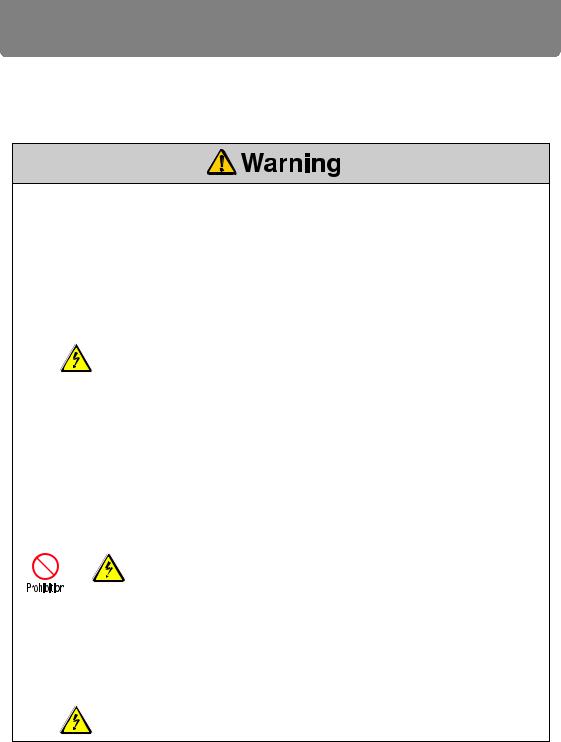
Safety Instructions
Precautions for Use
As this section contains important safety-related information, be sure to read the following carefully beforehand in order to use your projector correctly and safely.
Power Supply
During installation, keep the projector plug easily accessible so that the projector can be unplugged immediately if necessary, or keep a circuit breaker within reach.
If the following situations occur, turn the power off, remove the power plug from the power outlet and contact the Canon Customer Support Center. Failure to do so could cause a fire or result in an electric shock.
•If smoke is emitted
•If an unusual smell or noise is emitted
•If water or other liquid has entered the projector
• If metal or any other foreign material has entered the projector
•If the projector is knocked over or dropped and the cabinet is damaged
Pay attention to the following points regarding the power source, power plug and handling of the connector. Failure to do so may cause a fire or electric shock.
•Do not place any objects on the power cord and do not allow it to become trapped under the projector.
•Do not cover the power cord with a carpet.
•Do not modify or excessively bend, twist, pull, wind, or bundle the power cord.
•Keep the power cord away from heaters and other sources of heat.
• Do not use a damaged power cord. If the power cord is damaged, contact the Canon Customer Support Center.
•Do not use any power source with a voltage other than the voltage indicated (AC 100 – 240 V).
•Do not insert any metal objects into the contact parts of the power plug or connector.
•The power cord included with this projector is for use exclusively with this product. Do not use this cord for other products.
• Do not remove the power plug or connector with wet hands.
14

Safety Instructions
Pay attention to the following points regarding the power source, power plug and handling of the connector. Failure to do so may cause a fire or electric shock.
•Insert the power plug and connector securely up to the base. Additionally, do not use a damaged power plug or an outlet that is loose.
•Do not pull the power cord and be sure to hold the power plug or connector when removing. Incorrect handling may damage the power cord.
•When using an extension cord, do not exceed the cord’s rated capacity.
•Do not exceed the rated capacity of the outlet (as by using it for more than one piece of equipment), which poses a risk of fire
from overheating.
• Periodically inspect the power plug and outlet and remove any dust or dirt from between the plug and the outlet.
•Do not touch the projector itself, the power cord, or the cable if lightening strikes.
•Do not move the projector until you have switched off the power, removed the power plug from the power outlet and unplugged any other cables.
•Unplug the projector before cleaning or maintenance.
•Before you install or remove the lens unit, be sure to unplug the power plug of the projector from the power outlet.
Instructions Safety
15

Safety Instructions
Installation and Use
Pay attention to the following points regarding installation and handling of the projector. Failure to do so may cause a fire, electric shock or personal injury.
• Do not use the projector where it might get wet, such as outdoors or by bathtubs or showers.
• Do not place containers containing a liquid on top of the projector.
•Make sure to implement anti-fall measures such as an anti-fall wire when installing the projector in high places, for example, installing it on the ceiling.
•Do not remove the cabinet from the projector or disassemble it. The interior of the projector contains high-voltage components as well as parts that are hot. If inspection, maintenance or repair is required, contact the Canon Customer Support Center.
•Do not disassemble or modify the projector (including consumable parts) or the remote control.
•Do not look directly into the exhaust vents during use.
•Do not insert any object into vents in the projector, such as the air intake vent or exhaust vents.
•Do not place a pressurized can in front of the exhaust vents. The pressure of the contents of the can may increase due to heat from the exhaust vents and this could result in an explosion.
•When cleaning off dust or dirt from projector parts such as the
lens or filter, never use any spray that is flammable. Internal parts that become hot may ignite and cause a fire.
•Do not use adhesives, lubricants, oils, or alkaline detergents for maintenance of the projector. They could adhere to the cabinet and damage it, possibly resulting in the projector falling from its mounting and causing an accident or personal injury.
•As strong light beams are emitted
while the projector is in use, do not look directly into the projector lens. Doing so could cause an
eye injury. Pay particular attention to prevent small children from doing so.
•Operators shall control access to the beam within the hazard distance or install the product at a height that will prevent eye exposure within the hazard distance.
16
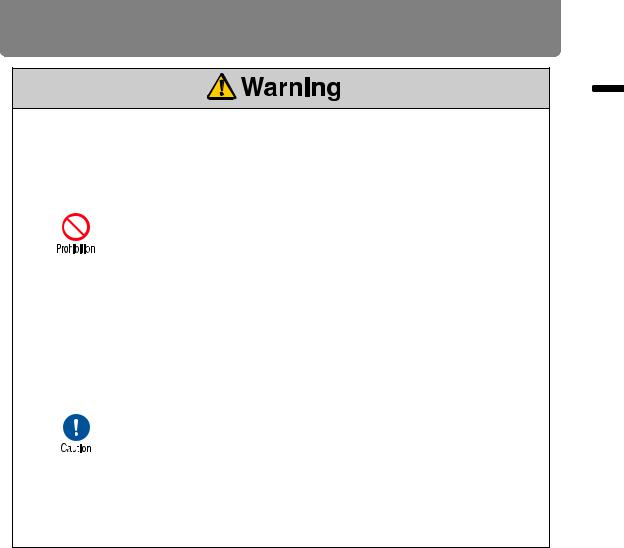
Safety Instructions
Pay attention to the following points regarding installation and handling of the projector. Failure to do so may cause a fire, electric shock or personal injury.
•Light from the projector is classified as Risk Group 2 (RG2) according to IEC 62471-5:2015. However, it may be classified as Risk Group 3 (RG3) when a replacement lens with a projection ratio larger than 2.6 is used. Refer to the Hazard Distance table for various replacement lenses (P18).
•Do not hold or install optical instruments (such as magnifying
glasses, reflectors, or glasses) in the path of light from the projector. If projected light is refracted or reflected and enters people’s eyes, it may result in eye injury.
•No direct exposure to the beam shall be permitted.
•Do not lift the projector alone. Have at least one assistant.
•When setting the projector on a high surface for projection, be sure the surface is flat and stable.
•Do not use the projector on a soft surface such as carpet or sponge mat, etc.
•For ceiling mounting or other installation work, request service from a qualified technician or the Canon Customer Support Center. Poor installation work could result in an accident.
• To avoid hazards such as parts falling when the lens of a ceilingmounted projector is replaced, request service from a qualified technician or the Canon Customer Support Center.
•Do not use where combustible or explosive gases may occur. The lamp in the projector becomes hot and poses a risk of fire if it ignites.
Instructions Safety
17

Safety Instructions
RG2-3 label
Hazard Distance When Equipped with a Replacement Lens (IEC 62471-5)
|
Projection ratio*1 |
WUX7500 |
WUX6700 |
WUX5800 |
RS-SL01ST |
1.49-2.24:1 |
|
—*2 |
|
RS-SL02LZ |
2.19-3.74:1 |
167 cm (5.5') |
167 cm (5.5') |
154 cm (5.1') |
|
|
|
|
|
RS-SL03WF |
0.80:1 |
|
—*2 |
|
RS-SL04UL |
3.55-6.94:1 |
400 cm (13.1') |
400 cm (13.1') |
367 cm (12') |
|
|
|
|
|
RS-SL05WZ |
1.00-1.50:1 |
|
—*2 |
|
RS-SL06UW |
0.54:1 |
|
—*2 |
|
*1 Projection ratios are calculated values based on a 16:10 screen aspect and 100-inch screen size.
*2 Light from the projector is classified as Risk Group 2 (RG2) according to IEC 62471-5:2015.
Hazard Distance
•During projection, looking into the lens from distances closer than this poses a risk of vision impairment or other serious injury.
•When a projection lens with a hazard distance indicated on it is used with the projector, the operator shall either install the product at a height that will prevent eye exposure within the hazard distance or control access to ensure that persons do not approach within the hazard distance.
18
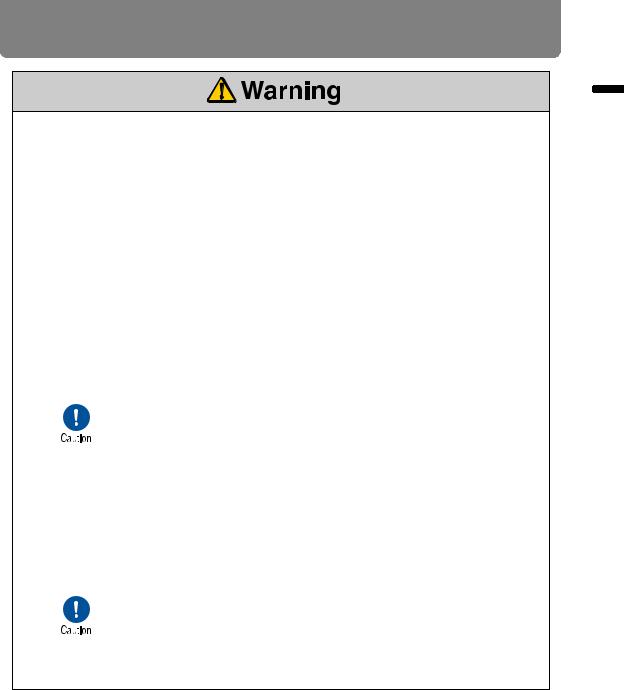
Safety Instructions
Lamp
This projector uses a high-pressure mercury lamp. The mercury lamp has the following characteristics.
•The lamp will gradually become darker over time.
•Impact, abrasion, or use of worn-out lamps may cause lamps to rupture (accompanied by a loud noise) or burn out.
•Lamps are more likely to rupture after the lamp replacement message is displayed (see “Replacing the Lamp” (P210)). Replace the lamp with a new one as soon as possible.
•Useful life of lamps varies widely from lamp to lamp and depending on the environment of use. Some lamps may fail or rupture soon after they are first used.
•Be prepared by keeping a spare lamp.
Note the following precautions during lamp replacement or when a lamp has ruptured.
•If the lamp ruptures, dust and gas (containing mercury vapor) may come out of the exhaust vents. If this happens, immediately open the windows and doors to provide ventilation to the room. Ruptured lamps may scatter shards of glass inside the projector. Contact a qualified technician or the Canon Customer Support
Center for cleaning and inspection of the projector interior and lamp replacement.
•If you accidentally inhale gas from the lamp or get any pieces in your eyes or mouth, consult a doctor immediately.
Note the following precautions when replacing lamps that stop working. Failure to do so could result in personal injury.
•If illumination suddenly stops, either when you turn the projector on or after it has been on for a while, the lamp may have ruptured. In this case, never attempt to replace the lamp by yourself. Always request service from a qualified technician or
the Canon Customer Support Center.
• With ceiling-mounted projectors, the lamp may fall out when you open the lamp cover, or during replacement. During replacement, make sure no one is under the projector, and stand to the side of the lamp cover, not directly under it.
Instructions Safety
19
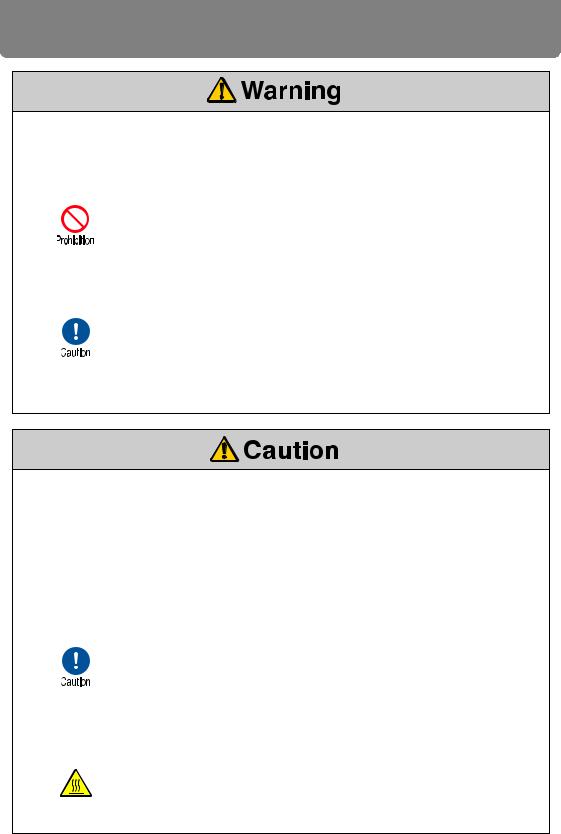
Safety Instructions
Remote Control Batteries
Pay attention to the following points regarding handling of batteries. Failing to do so could result in a fire or personal injury.
•Do not heat, short circuit or disassemble the batteries, or place them in a fire.
•Do not attempt to recharge the batteries that are included with
the remote control.
•Remove the batteries when they are flat or when the remote control will not be used for a long period of time.
•When replacing the batteries, replace both at the same time. Also, do not use two batteries of a different type at the same time.
• Insert the batteries with the + and – terminals in the correct directions.
•If any liquid from inside the batteries leaks out and contacts your skin, be sure to wash the liquid off thoroughly.
Handling
Pay attention to the following points regarding installation and handling of the projector.
•If the projector will not be used for a long period of time, be sure to remove the power plug from the power outlet to ensure safety. Failure to do so presents a risk of fire if dust accumulates on the plug or outlet.
•Do not plug headphones or earphones into the AUDIO OUT terminal. Doing so may cause hearing impairment.
•Do not set the volume too high initially. Doing so may cause hearing impairment from sudden sounds played at high volume.
Lower the volume before turning off the projector, and after startup, raise it gradually.
•Do not touch parts of the cabinet around and above the exhaust vents, which may become hot during projection. Pay particular attention in preventing young children from touching these parts.
Additionally, do not place any metal objects around or above the exhaust vents. Such objects may become hot from the projector, which may result in burns or other injury.
20
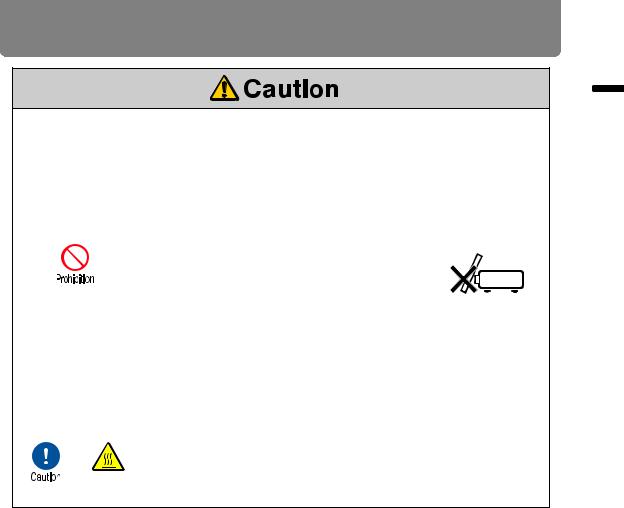
Safety Instructions
Pay attention to the following points regarding installation and handling of the projector.
•Do not place any heavy objects on top of the projector or sit/ stand on it. Pay particular attention to prevent small children from doing so. The projector may be knocked over and this could result in damage or a personal injury.
•Do not place the projector on an unstable or slanted surface. Doing so may cause the projector to fall or be knocked over and could result in a personal injury.
•Do not place any objects in front of the lens during projection. Doing so could cause a fire.
• The projector is provided with a lens shift function to move the lens up, down, left, and
right using the motor. Do not touch the lens while it is moving. Touching the lens when it is moving may result in personal injury.
•Before replacing the lens unit, wait at least 30 minutes after the projector is turned off to allow the lens unit to cool down. Failure to do so may result in burns or injury.
When handling the lamp, pay attention to the following points.
•Be sure not to handle the lamp immediately after it has been used. Be sure to switch off the power and wait for approximately
1 hour for the lamp and the projector to cool down sufficiently. Failure to do so could result in a burn due to heat from the lamp or projector.
Instructions Safety
21

For Safe Use
Carrying and Installation
Pay attention to the following points when carrying or transporting the projector.
•If transportation is necessary, the lens unit should be removed before transporting the projector. If the projector is subjected to excessive impacts during transportation, the lens unit may be damaged.
•This projector is a precision instrument. Do not knock it over or subject it to impacts. Doing so may cause a malfunction.
•Retract the adjustable feet before moving the projector. Leaving the feet extended may cause damage.
•When carrying or holding up the projector after attaching the lens unit, be
sure not to hold the lens. Doing so may cause damage to the lens unit.
•Do not touch the lens with bare hands. Any smudges or fingerprints on the lens may affect image quality.
•Protection of the projector cannot be guaranteed if used packaging or shockabsorbent materials are reused. Fragments from shock-absorbent material may also enter the interior of the projector which could cause a malfunction.
22

For Safe Use
Pay attention to the following points when installing or using the projector.
•Be careful of condensation.
If the projector is abruptly taken to a warmer location, or if the room temperature rises abruptly, moisture in the air may condense on the lens or mirror and affect projected images. In this case, wait a while and make sure the moisture has evaporated before resuming use.
•Do not install the projector in a location where the temperature is high or low. Doing so may cause a malfunction. Ranges for the environment of use and storage are as follows.
•Environment of use: 0°C (32°F) to 40°C (104°F), 20% to 85% RH
•Storage temperature: -20°C (-4°F) to 60°C (140°F)
•When using the projector at altitudes above 2,300 m (7,545.8'):
Adjust projector installation settings from the menu (P147). Failure to adjust the settings may shorten the lamp life or damage the lamp.
•Do not install the projector facing the wrong direction. Install the projector so that it is not tilted left or right by more than 10°. Failure to do so may shorten the lamp life or damage the lamp.
•Do not block the air intake or exhaust vents. Blocking the vents may trap heat inside the projector, which may shorten the useful life of optical components or other parts and damage the projector.
•Install the projector leaving at least 50 cm (1.6') between air intake/exhaust vents and walls on each side of the projector. Leave a gap of at least 2 cm (0.8") from the bottom of the projector. There is an air intake underneath the projector. Failure to leave enough space may trap heat inside the projector and damage it.
 At least
At least
50 cm (1.6')
At least
2 cm (0.8")
At least |
At least |
At least |
50 cm (1.6') |
50 cm (1.6') |
50 cm (1.6') |
•Do not place any objects on top of the projector that may change shape or color due to heat.
•Do not install the projector near high-voltage electrical power lines or an electrical power source. This may cause malfunction.
•Clean the air filter regularly (P207). Dust that accumulates inside over long periods without cleaning may eventually damage the projector or affect picture quality.
•Afterimages may occur when the image changes after the same image has been projected for some time. This is due to the nature of the LCD panels and does not indicate a problem. The afterimage will dissipate after a while during normal projection.
Use Safe For
23

Before Installation
Precautions When Carrying / Shipping the
Projector
Prepare the projector as described below before carrying it.
•Disconnect the cables connected to the projector. Carrying the projector with the cables attached may cause an accident.
•Retract the adjustable feet before moving the projector. Leaving
the feet extended may cause damage.
• Do not subject the projector to strong impacts or vibrations.
Precautions for Installation
Be sure to read “Safety Instructions” and “For Safe Use” (P7 – P22). Also take the following precautions during installation.
•Do not strike the projector or subject it to impact. Doing so may cause a malfunction.
•Do not install the projector standing on one side or in other
unsteady positions. The projector may be damaged if it tips over.
■Do Not Use in the Following Environments
•Locations with excessive humidity, dust, oily smoke or tobacco smoke
Adhesion to the lens, mirrors or other optical parts may reduce image quality.
•Near high-voltage power lines or sources of electrical power
This may cause malfunction.
•On soft surfaces such as carpets or cushioned mats
This may cause a fire or damage the projector.
•Locations with excessive temperature or humidity
•Locations subject to vibration or impact
• Near heat or smoke detectors
•Near the ocean, or near air conditioner vents
•Locations where corrosive gases occur, such as sulfur gas from hot springs
This may damage the projector. Acceptable ranges for operating and storage temperature and humidity are as follows.
*Operating temperature and humidity applies to when the projector is projecting or in standby mode.
Operating temperature |
Operating humidity |
Storage temperature |
0°C (32°F) – 40°C (104°F) |
20% – 85% |
-20°C (-4°F) – 60°C (140°F) |
24
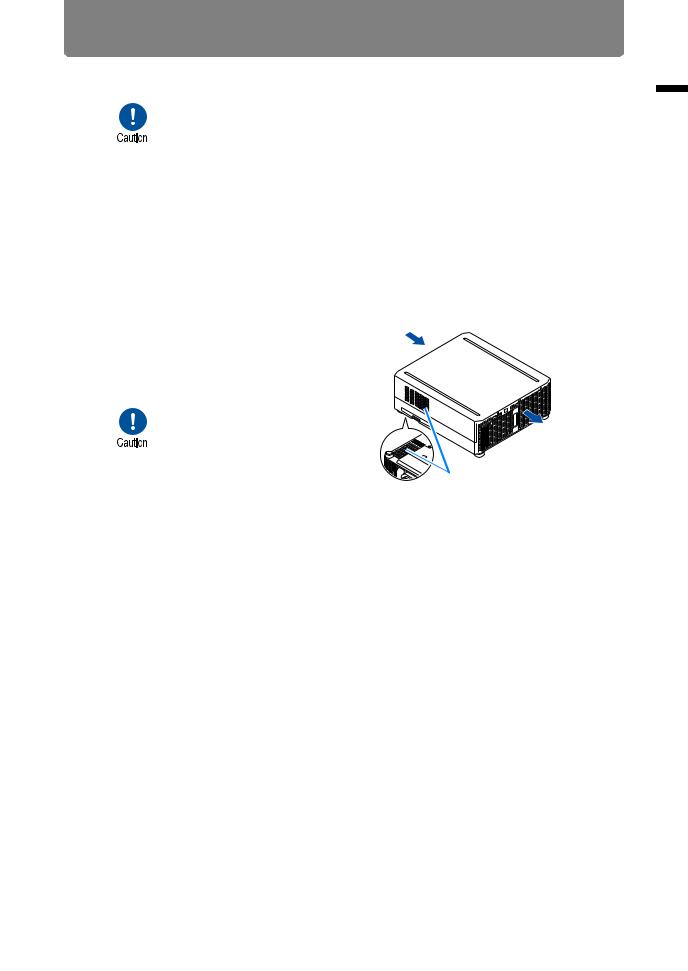
Before Installation
■ Do Not Touch the Lens with Bare Hands
Do not touch the lens with bare hands. Any smudges or fingerprints on the lens may affect image quality.
■ Allow a 30 Min. Warm Up before Focus Adjustment (P46), if Possible
The focus position may not stabilize immediately after startup, due to lamp heat. When adjusting focus, it is also helpful to use the test pattern (10) (P105, P152).
■Install at a Sufficient Distance from Walls and Other Obstructions
If the air intake or exhaust vent is blocked, heat will accumulate inside the projector, possibly resulting
in a shortened projector lifetime or a malfunction. Similarly, do not install in narrow, enclosed spaces
with poor ventilation. Install in a well-ventilated location.
Ensure a minimum clearance of 50 cm (1.6')
above, on both sides, and behind the projector. Also ensure a minimum clearance of 2 cm (0.8") below the projector.
■ Be Careful of Condensation
If the temperature of the room rises suddenly, moisture in the air may condense on the projector lens and mirror, causing the image to become blurred. Wait until the condensation has evaporated for the image projected to return to normal.
■ At Altitudes above 2,300 m (7,545.8'), Adjust the Settings
Projector settings must be adjusted when using the projector at altitudes of 2,300 m (7,545.8') or higher. Specifically, refer to instructions for [High altitude] (P147) in the [Install settings] menu.
Installation Before
25
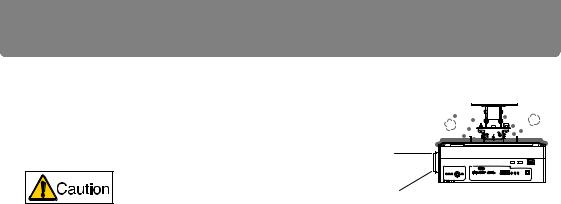
Before Installation
■ When Using Mounted on the Ceiling
When the projector is used mounted on the ceiling or installed in a high location, it is necessary to periodically clean the air intake and exhaust vents, and the area around the air filter. Dust that accumulates in intake or exhaust vents may impair ventilation, raising the temperature inside and posing a risk of damage or fire. Use a vacuum cleaner or similar means to remove dust from the intake vent and exhaust vent.
26

Before Installation
■Install Facing in the Correct Direction
•The projector can be installed facing any direction, as shown below. However, projection upward or downward may shorten the useful life of the lamp.
•Do not attempt to install the projector for upward or downward
projection by yourself. Always request installation by a qualified technician or the Canon Customer Support Center.
10° 10°
Upward projection:
Inclination of the projector should be no more than 10° from the vertical axis.*
10° 
10° 






If installing the projector on the floor or hanging from the ceiling, the left/ right inclination of the projector should be no more than 10°.*
10° 10°
Downward projection:
Inclination of the projector should be no more than 10° from the vertical axis.*
Do not use the projector standing on its side.*
* Failure to do so may damage the lamp.
There are no options for installing the projector other than the ceiling attachment.
Installation Before
27

Before Installation
Copyright Notice
Please note that enlarging or reducing the size of an image for commercial purposes or public presentation may infringe on the legally protected copyright or the copyright holder of the original material.
Ensure Network Security
Take measures to ensure network security. Note that Canon is not liable in any way for direct or indirect loss from network security incidents, such as unauthorized access.
Before use, configure projector, computer, and network security settings appropriately.
•Set up the projector for connections only within your protected network, behind a firewall or the like, instead of direct Internet connections.
•When using the projector in a wireless network, also configure the Wi-Fi security settings.
•Change the Wi-Fi security key on a regular basis.
About Trademarks
•Ethernet is a registered trademark of Xerox Corporation.
•Microsoft and Windows are registered trademarks or trademarks of Microsoft Corporation in the United States and/or other countries.
•Mac, Mac OS and Macintosh are trademarks of Apple Inc., registered in the United States and/or other countries.
•HDMI, the HDMI logo and High-Definition Multimedia Interface are trademarks or registered trademarks of HDMI Licensing, LLC.
•PJLink is a registered trademark of JBMIA and pending trademark in some countries.
•PJLink is a registered trademark, or an application has been submitted for trademark, in Japan, the United States and/or other countries or regions.
•AMX is a registered trademark of Harman International Industries, Inc.
•Crestron®, Crestron RoomView®, and Crestron Connected™ are registered trademarks of Crestron Electronics, Inc.
•Extron and XTP are trademarks or registered trademarks of RGB Systems, Inc. in the United States and/or other countries.
•HDBaseT™ and the HDBaseT Alliance logo are trademarks of the HDBaseT Alliance.
•Wi-Fi is a registered trademark of the Wi-Fi Alliance.
•Wi-Fi CERTIFIED, WPA, WPA2, and the Wi-Fi CERTIFIED logo are used in reference to methods of configuration developed by the Wi-Fi Alliance.
•All other trademarks are the property of their respective owners.
28

Before Installation
Wireless LAN (Wi-Fi)
■ Countries and Regions Where Wireless LAN Use Is
Permitted
Use of the wireless LAN function is restricted under the laws, etc., of each country and region, and violation of these restrictions may be subject to punishment. Check the Canon website for a list of countries and regions where use of the wireless LAN function permitted.
Canon assumes no responsibility whatsoever for problems, etc., that may arise from use of the wireless LAN function in countries and regions other than those listed.
■ Model Number
WUX7500/WUX6700/WUX5800 (including WLAN module model: CH9-1346)
Complies with
IMDA Standards
DB00671
Statement on EC directive
Hereby, Canon Inc. declares that this equipment is in compliance with Directive 2014/53/EU. The full text of the EU declaration of conformity is available at the following Internet address:
http://www.canon-europe.com/ce-documentation
Wireless LAN Specifications
WUX7500/WUX6700/WUX5800
Frequency band(s): 2,401 MHz – 2,473 MHz
Maximum radio-frequency power: 12.7 dBm
FCC/IC NOTICE
Model: WUX7500/WUX6700/WUX5800 (including WLAN Module Model CH9-1346, FCC ID: AZD221)
This device complies with Part 15 of FCC Rules and ISED’s applicable licenceexempt RSS standard(s). Operation is subject to the following two conditions: (1) this device may not cause interference, and (2) this device must accept any interference, including interference that may cause undesired operation of this device.
This transmitter must not be co-located or operated in conjunction with any other antenna or transmitter except Canon accessories supplied or designated for this product.
This equipment complies with FCC/IC radiation exposure limits set forth for an uncontrolled environment and meets the FCC radio frequency (RF) Exposure Guidelines and RSS-102 of the IC radio frequency (RF) Exposure rules. This equipment should be installed and operated keeping the radiator at least 20 cm or more away from person’s body.
Installation Before
29

Open Source Software
The product contains Open Source Software modules.
For details, check the files obtained from “Software Used in This Product” on the download site (http://www.canon.com/iprj/). Please refer to the license information for each module, which is contained in the corresponding file.
Some third-party software permits the distribution of software modules in executable form only under the condition that the source code of such modules be made available freely. For information on how to acquire the source code for such third-party software, contact the distributor from whom the product was purchased.
30
